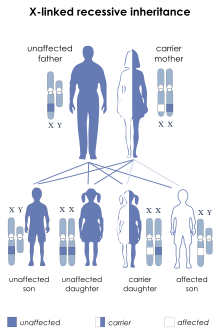Allan Herndon Dudley Syndrome
The Allan-Herndon-Dudley syndrome (ADHD) is a rare x-chromosmal inherited disease of the central nervous system ( X-linked mental retardation ) leading to severe mental developmental delays and disorders of the motor leads. This disease, which only affects male infants , leads to a developmental disorder even before birth .
The syndrome, first described in 1944 by Wiliam Allan, Florence C. Dudley and C. Nash Herndon, is the result of the disturbed formation of two thyroid hormone transporters . This means that thyroid hormones are not absorbed by cells of the nervous system that depend on them.
Symptoms
Affected children are noticed early on by muscle weakness (hypotension) and underdeveloped muscles . Joint deformities and contractures can later occur, which lead to an additional impairment of mobility, as well as muscle cramps and involuntary movements of the arms and legs. Most people with AHDS are therefore unable to walk on their own. Those affected also suffer from severe mental disorders that are so severe that they are mostly unable to speak.
Etiology and pathogenesis
After muscle injuries, stem cells of the skeletal muscle are activated. These divide and replace damaged muscle cells - the muscle heals. Healthy muscle stem cells form two new transporters for thyroid hormones after injury: MCT8 and OATP1C1. The former is defective in AHDS due to a mutation in the SCL16A2 gene. MCT8 mediates iodothyronine uptake in muscle and nerve cells. By themselves, stem cells absorb both hormones and allow the muscle to heal. If both transporters in healthy muscle stem cells were switched off, injured muscle cells would only heal slowly. Both transporters also mediate the uptake of thyroid hormones across the blood-brain barrier in the brain.
In AHDS, the active thyroid hormone T3 is missing in the muscles and the brain . Laboratory tests show elevated T3 levels (high T3 syndrome), while the TSH and FT4 levels are normal. It is unclear whether this is a result of decreased T3 uptake in certain cell types or a compensatory hyperdeiodination.
Heredity
The disease is X-linked - recessively inherited. Women who have two X chromosomes in each cell can inherit the disease, but usually do not develop the disease themselves, since the probability that both X chromosomes carry a mutated SLC16A2 gene is only minute. Men only have one X chromosome, so if mutated, the disease will manifest itself in them.
So far it has not been observed that a woman suffers from AHDS. In addition to the low joint probability of SLC16A2 mutations in both X chromosomes, it should also contribute to the fact that sick men are unable to reproduce.
therapy
Up to now there is no established therapy for AHDS. For theoretical considerations, TRIAC (triiodothyroacetate, a non-classical thyroid hormone also normally produced in the body) should be of benefit, but this did not help children noticeably in clinical studies - possibly because the therapy started too late. In 2014, a case was described in which therapy with TRIAC, which was started in infancy, markedly improved mental development and mobility.
Individual evidence
- ^ W. Allan, CN Herndon, Dudley FC. Some examples of the inheritance of mental deficiency: apparently sex-linked idiocy and microcephaly. In: Am. J. Ment. Defic. 1944; 48, pp. 325-334.
- ↑ Steffen Mayerl, Manuel Schmidt, Denica Doycheva, Veerle M. Darras, Sören S. Hüttner, Anita Boelen, Theo J. Visser, Christoph Kaether, Heike Heuer, Julia von Maltzahn: Thyroid Hormone Transporters MCT8 and OATP1C1 Control Skeletal Muscle Regeneration. In: Stem Cell Reports. 10, 2018, p. 1959, doi : 10.1016 / j.stemcr.2018.03.021 .
- ↑ Ainhoa Iglesias, Olga Esther Alonso, Ana Gómez ‐ Gila, Juan A. Campos ‐ Cerveró, María Palomares, Eduvigis Contreras, Beatriz Morte, Maria Jesús Obregón, Juan Bernal, José C. Moreno: TRIAC TREATMENT OF AN INFANT WITH ALLAN ‐ HERNDON -DUDLEY SYNDROME (AHDS): EFFECTS ON IODOTHYRONINES IN SERUM AND CEREBRO-SPINAL FLUID . 38th Annual Meeting of the European Thyroid Association, Santiago de Compostela, Spain, September 10th, 2014.
Web links
- Allan Herndon Dudley Syndrome (AHDS) , entry on orpha.net, seen January 17, 2015
- Entry 300523 at OMIM
